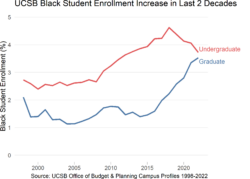UC Santa Barbara Black graduate student rates are at an all-time high of 3.5%, and the percentage of Black undergraduates majoring in S.T.E.M. fields has risen to 2.9% from 1.89% in 2012.
In the last seven years, the percentage of Black graduate students has risen 1.9 percentage points, from 1.4% in 2014 to 3.53% in 2022, according to UCSB’s Office of Budget & Planning campus profiles.
The percentage of degrees awarded to Black undergraduates in S.T.E.M. departments reached a high of 3.31% in 2016 and has increased by 0.31 percentage points since 2017.
Since 1997, the percentage of Black undergraduate and graduate students has increased by 1.05 percentage points, from 2.66% to 3.70% of the student population. The number of Black students has gone from 503 students in 1997-98 to 967 students in 2021-22. The 2017-18 school year had the highest percentage of Black students, at 4.35% with 1,090 students.

Computer science professor Tim Sherwood and Black studies professor Sharon Tettegah founded the Sustaining Engagement & Enrichment in Data Science Program in partnership with the Center for Black Studies Research in 2021.
In doing so, the computer science department brought on Tettegah as an affiliate faculty member to deepen the computer science department’s collaboration with the Black studies department and better serve computer science students through projects, such as professor William Wang’s Center for Responsible Machine Learning — which emphasizes the social impacts of AI and machine learning.
The computer science department has had a below-average percentage of degrees by Black students for the past decade, except for 2015, when it reached 3%. For the past three years, Black students have made up 1% of degrees conferred in the computer science department.
Despite having a below-average percentage of Black students, the computer science department has employed various programs to increase diversity within their department.
The computer science department won the following grants focused on increasing diversity, according to professor and Chair Tevfik Bultan: a Center for Inclusive Computing data grant, “Scaling the Early Research Scholars Program” and “An inclusive and In-Depth Computing Curriculum to help Non-majors Learn Small Patterns to Solve Big Problem.”
“We partnered with the National Science Foundation to develop a departmental plan for broadening participation in computing,” Bultan said. “We won multiple grants that have the specific intention of creating a more diverse and inclusive program for our students including an award from the Center for Inclusive Computing and the creation of our Early Research Scholars Program.”
The Early Research Scholars Program is supported by the National Science Foundation grant titled “Scaling the Early Research Scholars Program.” The principal investigator for this award is professor Diba Mirza.

Since 2016, the psychological & brain sciences department has had an above-average percentage of degrees by Black students, reaching 6% in 2016 and 2019, and 4% in 2021.
According to psychology professor and Department Chair Shelly Gable, the department created a new committee focused on improving diversity within the department in 2020.
“We formed a diversity, equity and inclusion committee a few years ago in our department, which is made up of faculty, graduate students and staff as well as undergraduate liaison from some of our undergraduate club programs,” she said.
The committee is currently working on a Strategic Action Plan to address all aspects of the community, from the undergraduate students to faculty members. As part of that plan, they’ve asked faculty to review their syllabi and make sure course content includes contributions by women and underrepresented groups that highlights research which includes diverse samples in terms of race, ethnicity and gender.
The psychological & brain sciences department revamped undergraduate programs and created new organizations with lower barriers as well.
“We’ve revitalized our Psi Chi program, which is a national undergraduate honors program in psychology … We also created an undergraduate program that anyone interested in psychology can join.”
A version of this article appeared on p. 3 of the Feb. 17, 2022, print edition of the Daily Nexus.















